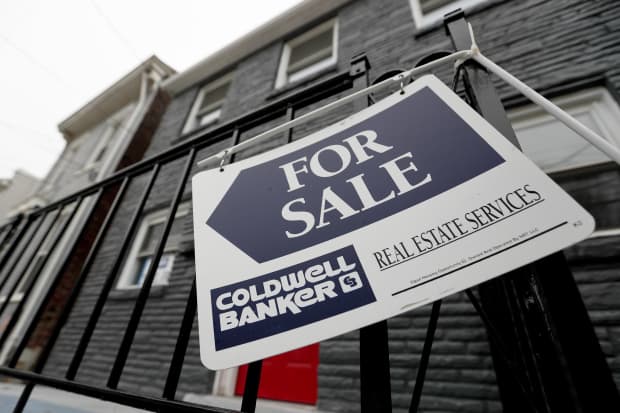
A house for sale in Pittsburgh
Associated Press
Intercontinental Exchange Inc., the owner of the New York Stock Exchange, borrowed $6.5 billion on Monday in the corporate bond market to help expand its footprint in the U.S. mortgage industry.
That’s more than half the $11 billion that ICE ICE, +1.52%, a global exchange, clearinghouse and data provider, agreed to pay for cloud-based mortgage platform provider Ellie Mae, in a cash and stock deal announced earlier this month.
ICE had no comment for this article, but said the addition of Ellie Mae to its platform helps establishes it “as the leading provider of end-to-end electronic workflow solutions serving the evolving U.S. residential mortgage industry,” in a statement earlier this month announcing its deal to buy Ellie Mae.
The 2007-’08 global financial crisis exposed major weaknesses in the mortgage underwriting and servicing industries, which resulted in states’ attorneys general, including Kamala Harris, Joe Biden’s pick as vice president, extracting $25 billion in foreclosure fines from major U.S. lenders.
Related: Democrats to open convention like no other as Biden’s big party goes virtual
While Ellie Mae doesn’t make mortgage loans itself, it is among a number of platforms looking to bring more of the estimated $11.2 trillion residential-mortgage finance market into the digital era.
Despite the pandemic and its economic shocks, the Federal Reserve’s unprecedented efforts to keep credit affordable and flowing during the crisis are expected to help push U.S. home loan originations to $3.1 trillion this year, a new post-2008 record, according to Goldman Sachs analysts.
It has also rarely been a better time for U.S. businesses to borrow in the booming U.S. corporate bond market, which last month saw yields on the closely watched ICE BofA US Corporate Index fall below 2% for the first time in history.
Read: A binge? Bulge? Or just the new normal for debt in America as Fed helps spur string of records
Pricing on the five-part ICE bond deal reflects the continuing hunt for yield among investors since March, when the Fed unleashed its raft of emergency lending and bond-buying programs to keep credit from drying up.
Specifically, the longest, a 40-year parcel of ICE bonds, cleared the market at a spread of 160 basis points above a risk-free benchmark to yield 3.04%, according to a person with direct knowledge of the dealings.
Price levels initially circulated in the area of 180 basis points by bankers looking to drum up interest in the debt offering, which was rated A3 by Moody’s Investors Service and BBB+ by S&P Global.
Most U.S. corporate bonds are priced at a “spread” above U.S. Treasurys TMUBMUSD10Y, 0.679%, with the spread being how much an investor is paid above a benchmark to own bonds.
Low bond yields have been credited with lifting major U.S. stock indexes back near their all-time highs, roughly 100 days since the onset of the coronavirus in the U.S. sent equities into one of the sharpest downward spirals in memory. The Dow Jones Industrial Average DJIA, -0.30% ended Monday’s session about 5.8% off its record high in February.
ICE said it plans to raise $9.25 billion in cash, including Monday’s debt raise, as well as $1.75 billion in equity through the sale of new shares of ICE common stock to buy Ellie Mae, in publicly filed deal documents.
Although mergers and acquisitions took a “nosedive” in the first quarter, a team of analysts led by Ken Johnson at Wells Fargo Investment Institute said they think volumes, particularly in “automation and data analytics,” could be poised for a pickup, in part because U.S. public companies reported more than $2.5 trillion of cash on hand during the second quarter.
Read: Coronavirus slashes deal-making globally: What to expect next
“The hard-hit brick-and-mortar retail and travel-and-leisure industries
also could present attractive M&A opportunities as they carve out and sell
businesses in an effort to repair balance sheets and improve liquidity,” Johnson’s team wrote in a note Monday.